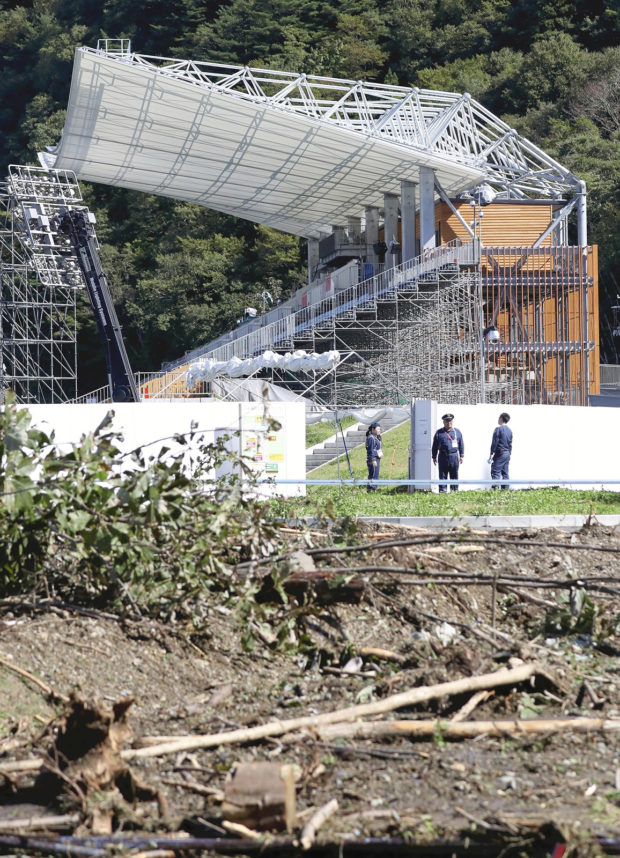TOKYO — There are many lessons from the recent Rugby World Cup, which ended in November having drawn about 1.7 million spectators, that can be applied to the upcoming Tokyo Olympics and Paralympics in 2020.
The Yomiuri Shimbun has learned details of the steps that the RWC 2019 organizing committee took to deal with a typhoon, illegal tickets and other issues, and a look at these measures reveals there are numerous issues that overlap with the Tokyo Olympics and Paralympics.
The RWC organizing committee has explained about measures and their background to the Tokyo Olympic organizing committee, and shared its experiences as a valuable lesson.
Unrealized match
The RWC organizing committee canceled two matches on Oct. 12, when a strong typhoon made landfall in Japan. At the same time, it worked to realize a scheduled match between Japan and Scotland scheduled for the following evening at the International Stadium Yokohama in Yokohama, with one official saying, “We can’t cancel a key event of the RWC.”
As the outcome of that match would determine whether Japan would advance to the knockout stage, it attracted particular attention.
The typhoon was forecast to pass over the Kanto region in the early hours of Oct. 13. Anticipating damage to the stadium, the RWC organizing committee considered using Tokyo Stadium in Chofu, western Tokyo, as an alternative venue. Since a sudden change of venue would trigger confusion among spectators, the committee decided to refund the price of the tickets and broadcast the match on TV without allowing spectators in to watch it.
However, about 400 security officers are needed to guard Tokyo Stadium, and it was found difficult to immediately secure enough personnel. For that reason, the committee decided to hold the Japan-Scotland match at the Chichibunomiya Rugby Stadium in Minato Ward, Tokyo, which requires fewer guards. RWC organizing committee officials stayed there overnight on Oct. 12 to make preparations, such as deploying security guards and securing necessary equipment.
In the end, the International Stadium Yokohama suffered little damage and so the match was held as scheduled. Japan’s national rugby team made the final eight in the RWC for the first time.
The RWC organizing committee had discussed such issues as alternative venues in case of natural disasters, the transportation of players and the resale of tickets for about a year and six months before the RWC. An official of the organizing committee emphasized, “We were able to respond flexibly because we’d held discussions based on the assumption of worst-case scenarios.”
Numerous fake tickets
Another major problem was illegal tickets, the existence of which was confirmed for 43 of the 48 matches. Many were copies of tickets with QR codes to be printed at home or elsewhere.
One visitor with an illegal ticket entered a venue, and the situation was discovered because another person whose ticket contained the same information as the illegal ticket went to the venue after them. There were also falsified tickets specifying fake venues or nonexistent seat numbers.
Many of these fakes were sold on a ticket resale website overseas. Since the website said buyers would be refunded if they were refused entry, the RWC organizing committee issued about 1,400 certificates to verify the invalidity of tickets. Some people left venues without receiving the certificates, so the actual number of illegal tickets was even higher.
According to the National Consumer Affairs Center of Japan, it received multiple complaints that even though buyers showed the certificates to the website, it refused to give them a refund.
“While RWC rules and regulations prohibit the resale of tickets, many people had bought tickets on overseas websites. It’s necessary to further raise public awareness for the Tokyo Olympics,” an official of the RWC organizing committee said.
In late November, the RWC organizing committee explained about problems during the RWC and how it handled them to people including Yoshiro Mori, 82, president of the Tokyo Organizing Committee of the Olympic and Paralympic Games.
The Olympic organizing committee is considering devising guidelines for deciding on the postponement or cancellation of competitions in case of typhoons, and asked the RWC organizing committee about the background of the cancelation of three RWC matches in Iwate and other prefectures.
In addition, tickets for the Tokyo Olympics will be sold in the same manner as for the RWC, so the Olympic organizing committee is increasingly cautious about copying and forgery, and is examining RWC cases.
“The know-how about the management of the RWC is very important, and we want to refer to it in dealing with various issues,” the committee official said.


